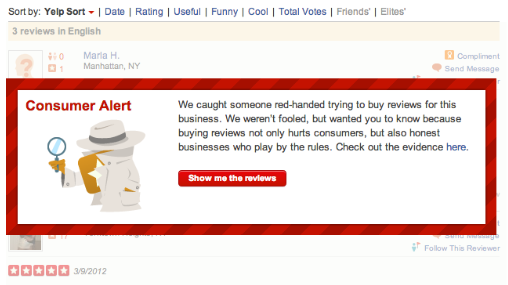Online reviews have become an extremely popular way for consumers to get access to real-life experiences and information about products, services, and businesses. Before making a purchase, many people – probably you included – head to the Internet to check out the lay of the land before dropping any cash. The review format allows us to be better informed consumers, and gives us more choice in where and how to spend our money. For businesses, however, online reviews can be a double-edged sword, particularly when it comes to Yelp, a site that’s become known for making or breaking businesses in fairly short order, and today announced a new consumer alert program designed to alert Yelpers to businesses that fake them.
The Role of Online Reviews in Inbound Marketing
Glowing online reviews are great social proof and can help convince a potential customer that’s on the fence to choose your establishment over another, but bad reviews can do the exact opposite, and because large review sites like Yelp basically take “word of mouth” to an entirely new level, the repercussions can be serious enough that people all over the world can end up knowing about you. Just ask Here Comes The Bride, a New Jersey bridal shop that incurred the wrath of the Internet last year after a customer posted a review about the shop owner’s discriminatory practices.
Since online reviews have become so important to a business’s image, many businesses think they need to have those glowing reviews at any cost, and when they can’t get actual customers to take the initiative and post good things, some turn to hiring people to write fake ones. Gaming the system in this way is explicitly against the rules on Yelp, but it doesn’t stop people from doing it anyway, and that’s why Yelp today has announced its new consumer alert program that will ferret out fake reviews and punish the business responsible by slapping a large warning image on the business’s Yelp profile. As Yelp explained today on their blog, “The large majority of businesses on Yelp play by the rules and work tirelessly to provide the best customer service and products to their clients. We salute their efforts and entrepreneurship. They inspire us to work even harder to protect the site from faux reviews, so that they have a fair opportunity to bask in the glow of their shining stars.”
The alerts will remain active for 90 days and then be removed, unless Yelp uncovers further attempts to mislead readers. The post also explains that this is just the first step – the next step will be to let readers know when a business has received a large number of reviews from the same IP address, which can be a red flag as far as authenticity goes, especially if the IP in question is coming from a completely different continent. Anyone that looks to include reviews as part of their inbound marketing mix should be aware of these alerts, as they can have an extremely detrimental impact on the public opinion of your business.
[single_callout/]














